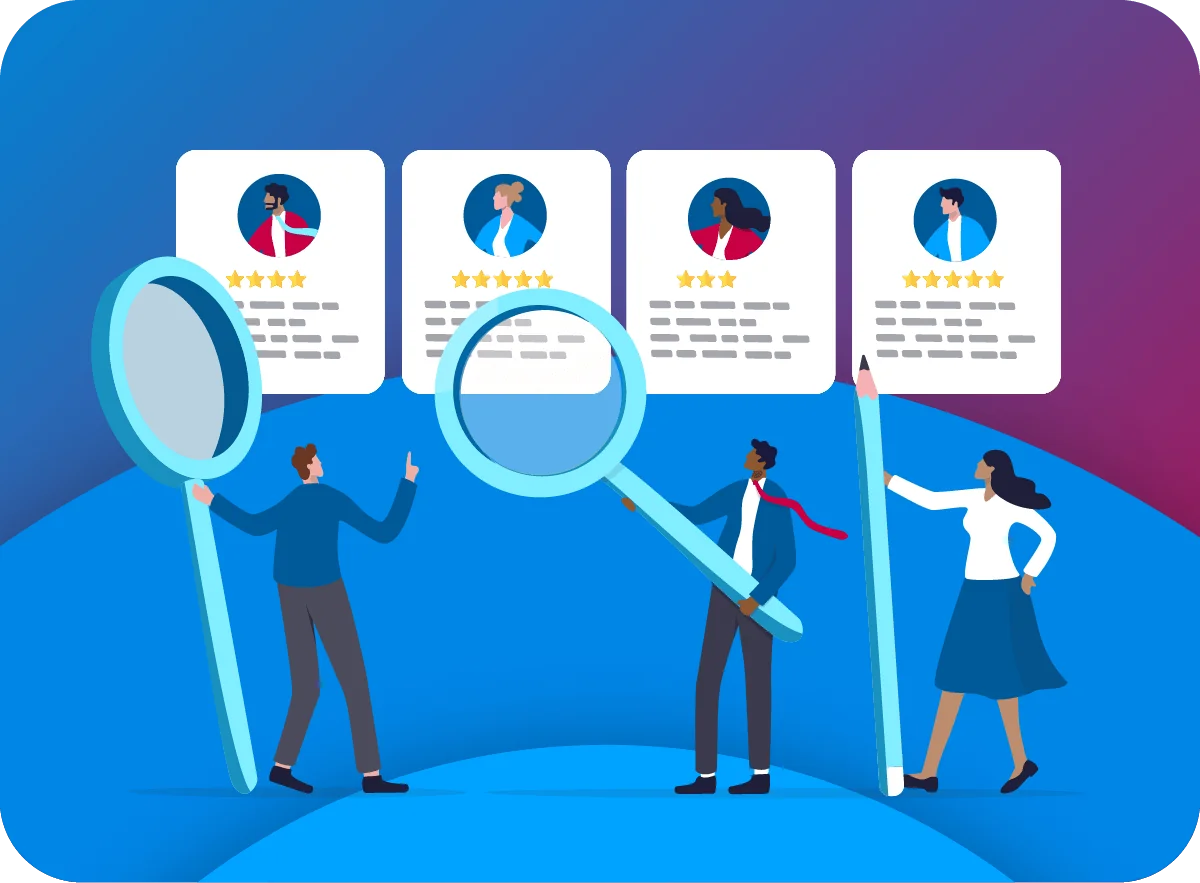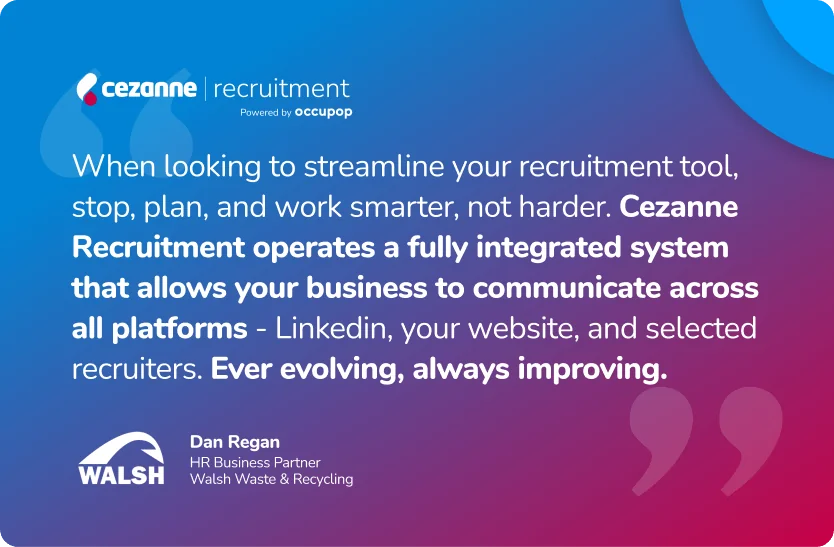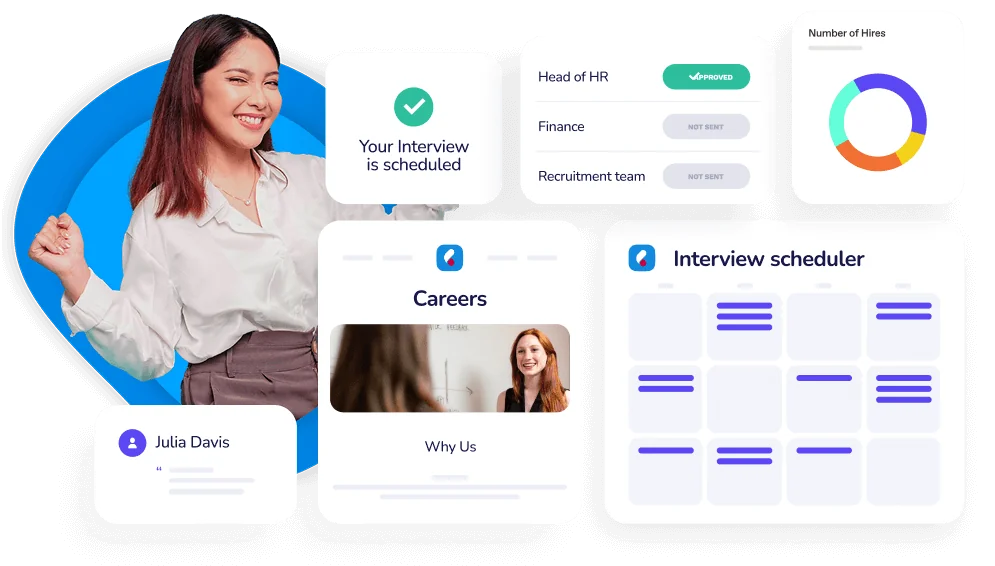A complete guide to the tools that streamline your hiring process
Recruitment software: it’s the behind-the-scenes hiring hero you didn’t know you needed. Whether you’re juggling CVs in your inbox or stuck in spreadsheet hell, this digital sidekick is here to save the day. From posting job ads and tracking applicants, to scheduling interviews and crunching hiring data, recruitment software helps you cut the faff and focus on what matters: finding great people, faster.
Whether you’re a growing SME or a big-name brand, recruitment software makes hiring less painful, less admin-heavy (yay!), and a whole lot smarter. But what actually is it? What can it do? And how on earth do you pick the right one without falling down a rabbit hole of sales jargon?
Scroll down to get the full lowdown!
What does recruitment software do?
From job post to job offer
Recruitment software is the behind-the-scenes hero making hiring faster, smarter, and easier for businesses of all sizes. It replaces outdated recruitment practices and manual tasks with automated, data-driven workflows, powerful scheduling tools and even AI-powered intelligence. So, no more spreadsheets, Post-It notes, or chasing hiring managers for feedback – just a slick, centralised system that keeps everything (and everyone) moving. It’s like giving your candidate attraction and hiring processes a much-needed upgrade.
The goal? To streamline and improve your recruitment processes, boost consistency, and deliver a better experience for both recruiters and candidates.
Take Cezanne Recruitment: it’s packed with class-leading tools and features that make the entire end-to-end recruitment process simpler from day one. Why not take a look?
View recruitment software features brochureMany modern recruitment software platforms often include a wealth of helpful features, including:
- Job posting and distribution: Publish vacancies across multiple job boards, social media, and your careers site from one place.
- Applicant tracking system (ATS): Track candidates through every stage of the hiring process.
- Talent pooling: Keep a dynamic reserve of qualified candidates on hand, ready to fill roles as they arise.
- Interview scheduling: Coordinate availability and book interviews with built-in calendars or integrations.
- Analytics and reporting: Measure time-to-hire, source of hire, DEI statistics and other key recruitment metrics.
- Easy capture application forms: Customisable application forms ensure you capture all the necessary information while providing a seamless experience for applicants.
The benefits of using recruitment software
Lightening the load for hiring managers and HR teams
Using recruitment software can deliver major advantages for HR teams and hiring managers. Whether you’re a busy in-house recruiter juggling multiple roles, or an HR manager looking to streamline your hiring process, the right solution can make a big difference. Key benefits include:
-
Faster hiring:
Reduce time-to-fill by automating repetitive tasks.
-
Reduced recruitment costs:
Cut down on agency fees, advertising spend and admin time.
-
Improved candidate experience:
Keep applicants informed and engaged throughout the process.
-
Reduced admin:
Centralise recruitment activity to minimise paperwork and email chains.
-
Better collaboration:
Share candidate notes, ratings, and feedback easily with team members.
-
Smarter decisions:
Use real-time data to identify hiring trends and bottlenecks.
-
Increased compliance:
Track diversity data, manage GDPR preferences, and create audit-ready reports.
Walsh Waste & Recycling Case Study
Real world example
Waste management firm Walsh Waste & Recycling were being hamstrung by cumbersome outdated recruitment processes, which slowed down their hiring activities and impacted overall efficiency. However, when they switched to a modern recruitment software solution, they enjoyed a massive 85% reduction in recruitment costs, a 50% reduction in time to hire, and a 70% reduction in no show rate.
Learn more about their journey here
Types of recruitment software
Deciding what hiring tools are right for your business
Recruitment software comes in many shapes and sizes, and the right solution often depends on your organisation’s specific hiring needs, structure, and goals. From simple applicant tracking to full-scale recruitment, onboarding and lifecycle management, here are some of the main types of recruitment software you’ll come across on the market:
It’s also worth noting that most recruitment software solutions are now Cloud-based and have proven popular for their scalability and ease of access. However, on-premise tools (i.e. ones that are physically installed onto a company’s systems) are still available and sometimes offer more customisation options – although they are considered somewhat dated now.
Ideally, the perfect recruitment platform is one that includes all those features; but in a modular, scalable platform that evolves and adapts as your needs change. And, if you choose one that integrates with a modern HRIS, you’ll enjoy a seamless experience across the entire employee lifecycle.
Want to know more about what an HRIS does? Then check this out…

How to choose the right recruitment software
What to look for, what to avoid, and how to decide.
Choosing the right recruitment software is about much more than just comparing price tags. It’s about asking the right questions to potential suppliers, finding a tool that fits your unique hiring challenges, integrates seamlessly with your existing systems, and grows alongside your business. After all, you don’t want to invest in a brand-new system, after only to find a year down the line it’s no longer fit for purpose!
To make a smart choice, consider these crucial factors that can make or break your recruitment success:
-
Hiring needs:
Are you hiring a few people a month or running high-volume campaigns?
-
Ease of use:
Is the interface intuitive? How steep is the learning curve?
-
Integration:
Does it connect with your existing HR and payroll systems?
-
Scalability:
Will it grow with your business?
-
Reporting:
Reporting: Will it help you demonstrate the success and RoI of your activities?
-
Support and training:
What onboarding, support, and updates are included?
Tip: When investigating potential suppliers, get a hands-on personal demonstration of the recruitment technology you’re interested in. Many suppliers – including us here at Cezanne – offer 1-1 demonstrations where you can see how the software operates in a real-word settings. This will help you get a better idea of how a platform works, and whether it’s right for your needs.
If you want to learn more about how to choose the right recruitment software for your business, check out our free Recruitment Software Buyer’s Guide. It’s packed with no-nonsense advice, expert tips, and everything you need to pick a solution that actually works (both now and in the future).
The main players in the recruitment software market
A veritable who’s-who
If you’re looking to take a closer look at recruitment tech, then check out some of these reputable suppliers
Let’s transform Recruitment together
Cezanne’s HR software and payroll is trusted by thousands of people professionals to help them better manage, support, engage and connect their people. Get in touch today to learn more.

Trends in recruitment software
AI, automation, and everything else in between.
The world of recruitment software is evolving quickly – driven by rapid advances in technology, changing candidate expectations… not to mention an increasingly turbulent jobs market. For software buyers, that means staying ahead and being prepared for what’s around the corner.
From smarter screening to seamless scheduling, today’s recruitment platforms are packed with features that make life easier for HR teams and hiring managers alike. Here are some of the key HR and recruitment software trends to watch as 2025 progresses…
-
More reliance on AI-powered screening:
Tools that score CVs or suggest top candidates using machine learning are becoming increasingly common. This means hiring teams can evaluate far more applications than they could manually – perfect for high-volume recruitment or when you need to fill roles quickly without compromising on quality.
-
AI-powered chatbots:
Artificial intelligence (AI) may not be universally adored or trusted, but its influence is now undeniable. In recruitment tech, AI-powered chatbots can handle initial candidate queries, and even screen applicants with pre-set criteria – freeing up recruiters to focus on the human side of hiring (and maybe have a lunch break for once).
-
Automated interview scheduling:
Cut out the endless email ping-pong with intelligent calendar integrations that sync with candidates’ and hiring managers’ availability. Interviews can be booked in seconds, reducing admin time and speeding up the hiring process.
-
DEI tools:
Built-in support for reducing unconscious bias and tracking diversity metrics. These tools often include features like anonymised applications, ensuring candidate evaluations focus solely on qualifications. Plus, they provide detailed analytics dashboards to monitor diversity metrics, helping organisations assess and enhance their inclusivity efforts.
-
Video interviews:
Seamless remote interviewing with recording and playback options. Great for keeping interviews flexible and inclusive; plus, hiring managers can rewatch clips to compare candidates without relying on hazy memories or scribbled notes.
-
Mobile-first design:
Recruiters and candidates expect tools that work on the go. Whether it’s reviewing CVs between meetings or applying for a job from a phone, mobile-friendly platforms keep the hiring process moving – no laptop lugging required.
Automation now plays a key role in successful HR and recruitment strategies. To discover how automation can help transform your HR department, check out this fabulous free guide.
Common challenges when using recruitment software
Barriers you may need to overcome
Recruitment software can be a total game-changer for hiring teams: cutting down admin, speeding up candidate screening, and keeping everything neat and tidy in one place. But, let’s be honest: it’s not always smooth sailing.
From sceptical team members clinging to their spreadsheets like security blankets, to the minefield of moving data over without losing a single CV, the path to recruitment software bliss has its bumps. And don’t forget, whilst AI and automation are both awesome, candidates still want to feel like humans are on the other end of the line! The key is to find a balance between efficiency and empathy.
Here’s a quick rundown of the most common challenges to watch out for:
- Resistance to change: Teams may be hesitant to adopt new tools or workflows if they don’t see the value in doing so.
- Data migration: Moving from spreadsheets or legacy systems can be complex without the right support.
- Over-customisation: Too many tweaks when you’re still learning how to use your new system can lead to a cluttered or confusing experience.
- Lack of use: And, people may not want to use it if they have to figure out things for themselves!
- Analytics and reporting: Measure time-to-hire, source of hire, DEI statistics and other key recruitment metrics.
- Losing the human touch: Automation and AI are both great, but personalisation and the human touch still matter – especially in candidate communication.
If you want to avoid those problems and implement a successful recruitment tech roll out, then check out this quick guide on how to do exactly that. Just click here.
Recruitment Software FAQS
Quick answers for curious recruiters
Whether you’re figuring out the difference between an ATS and a full platform, wondering if your small team actually needs one, or trying to decode if it has to plug into your HR system, we’ve got you covered.
This quick-fire FAQ section is here to clear up the confusion, cut through the jargon, and help you make smarter hiring tech decisions.
Isn’t recruitment software the same as an ATS?
Not quite! An ATS is a type of recruitment software focused purely on tracking applicants. Full recruitment platforms – like Cezanne Recruitment - offer wider features like onboarding, advanced analytics, and candidate relationship management... as well as an ATS. Think of an ATS as one piece of the puzzle - recruitment software can be much more comprehensive.
Can small businesses use recruitment software?
Absolutely. Many providers offer scalable plans or software designed specifically for SMEs, with just the right features (and price points) to support lean hiring teams. Tools like Cezanne Recruioment, for example, cater well to growing businesses that need smart, scalable solutions without the enterprise-level bloat.
How secure is recruitment software?
Reputable vendors offer strong security features, including GDPR compliance, data encryption, and role-based access controls. Many also provide regular audits, secure cloud hosting, and detailed permission settings—so only the right people see the right data at the right time.
Does recruitment software need to be part of a wider HRIS?
Not necessarily. Recruitment software can work well as a standalone tool, especially for smaller businesses or teams focused solely on hiring. However, integrating it into a wider HRIS (Human Resource Information System) can streamline data flow, improve reporting, and create a smoother experience across the entire employee lifecycle. For example, with Cezanne Recruitment, you can have it as a standalone solution, or as part of their end-to-end HRIS platform - it really depends on your organisation’s size, needs, and budget.
Will recruitment software replace recruiters?
No, and it shouldn’t! Recruitment is ultimately a human-led activity that requires a nuanced approach which automation and algorithms simply can’t compete with! But, it can free them up to focus on more strategic, high-value activities: like building vital relationships and making great hiring decisions.
How much does recruitment software cost?
It depends! Sorry, but it’s true. Pricing can vary widely based on features, number of users, and whether you're going for a standalone ATS or a full recruitment suite. Some providers offer pay-per-user monthly plans starting around £50, while others charge based on the number of open jobs or company size. The good news? Many platforms, like Cezanne’s, offer scalable pricing that grows with your business, so you’re not stuck paying for features you don’t need.
In the market for new recruitment tech? Then check out our comprehensive guide on the questions you should ask potential vendors:
So, is recruitment software right for your business?
Time for a closer look?
Recruitment software is no longer just a nice-to-have – it’s an essential tool for hiring in a modern job’s market. It helps teams work smarter, hire faster, and deliver a great experience to every candidate. Whether you’re just starting your recruitment tech journey or upgrading from an outdated system, the right software can make all the difference.
If you want to see recruitment software up close and in action, why not try Cezanne Recruitment for free? To give it a go, just follow this link.












